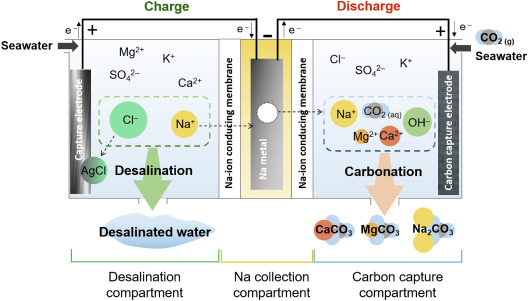Hybrid Seawater Desalination-Carbon Capture Using Modified Seawater Battery System
- Journal
- Journal of Power Sources
- Vol
- 410-411
- Page
- 99-105
- Year
- 2019
The water and carbon cycles are central to the Earth's ecosystem, enabling the sustainable development of human societies. To mitigate the global issues of water shortages and climate change, we report a new electrochemical system that fulfills two functions—seawater desalination and carbon dioxide air-capture—during the charge and discharge processes. The seawater desalination-carbon capture system utilizes a seawater battery platform, consisting of three major compartments (desalination, sodium-collection, and carbon-capture), which are separated by sodium superionic conducting ceramic membranes. It is found that the concentrations of sodium ions and chloride ions in fresh seawater (total dissolved solids ≈ 34,000 ppm) are significantly decreased by the charging of the seawater desalination-carbon capture system, resulting in brackish water (total dissolved solids ≈ 7000 ppm). The discharge process induces the air-capture of ambient carbon dioxide gases through carbonation reactions, which is demonstrated by the carbon dioxide gas removal in this compartment. The hybrid system suggests a new electrochemical approach for both desalination and carbon capture.

